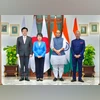Amid China threat, India and Japan to update 2008 security cooperation pact
India and Japan held a fresh edition of their 2+2 dialogue on Tuesday, amid China's increasing muscle-flexing in the Indo-Pacific region
)
Minoru Kihara, Minister of Defense of Japan, Yoko Kamikawa, Minister of Foreign Affairs of Japan, Rajnath Singh, Defence Minister of India, S. Jaishankar, External Affairs Minister of India
India and Japan agreed during the 2+2 dialogue on Tuesday to revise and update the 2008 Joint Declaration on Security Cooperation.
Driven by increasing alignment on strategic matters, including a shared vision for a rules-based order in the Indo-Pacific, the updated declaration will address current priorities and respond to the contemporary security challenges both nations face.
India and Japan recently held their third 2+2 foreign and defence ministerial meeting in New Delhi, with Foreign Minister S Jaishankar and Defence Minister Rajnath Singh hosting their Japanese counterparts, Yoko Kamikawa and Minoru Kihara.
The ministers of both countries "shared the intention to revise and update the 2008 Joint Declaration on Security Cooperation between India and Japan to reflect contemporary priorities and be responsive to contemporary security challenges facing them", said the joint statement, issued on Tuesday by the Ministry of External Affairs (MEA), after the third India-Japan 2+2 Foreign and Defence Ministerial Meeting.
The Declaration had laid the foundation for stronger security cooperation between India and Japan through strategic dialogue between foreign ministers and consultations between defence ministers and national security advisers.
Also Read
According to a Times of India report, the revised Declaration is expected to be announced during Prime Minister Narendra Modi's visit to Japan later this year.
Eye on China
New Delhi and Tokyo also discussed growing Chinese assertiveness in the South and East China Seas and agreed to explore the possibility of expanding security and defence cooperation with third-party countries to promote peace and stability in the Indo-Pacific.
Foreign Minister Jaishankar reportedly said, "A free, open, and rules-based Indo-Pacific is the top priority for both our countries." He added, "We explored the possibility of coordinating our respective security and development assistance where our interests converge."
Jaishankar also said that New Delhi and Tokyo agreed to prepare a new framework for security cooperation.
Enhanced defence cooperation and technology sharing
The joint statement expressed satisfaction with the progress made in New Delhi's proposed procurement of the Unified Complex Radio Antenna (UNICORN).
Both sides "appreciated the progress made for the transfer of UNICORN and related technologies and early signing of related arrangements", said the joint statement.
The UNICORN system comprises stealthy antennas for naval communications and has been developed by a group of Japanese companies.
However, the ToI report added that no India-Japan deal was announced for the transfer of stealth naval ship antennas to New Delhi, despite media reports from Tokyo suggesting the same.
Noting that the ministers appreciated that the first Joint Service Staff Talks between the two countries had been conducted, the joint statement said, "The ministers further appreciated the successful completion of the cooperation in the areas of unmanned ground vehicle and robotics."
India and Japan also agreed to accelerate future cooperation in defence technology.
According to the joint statement, "The ministers expressed their satisfaction with the seventh India-Japan Joint Working Group on Defence Equipment and Technology Cooperation. They concurred on accelerating future cooperation in defence equipment and technology."
The statement added that both sides also welcomed the Indian Navy and Japan Maritime Self Defense Force "exploring future cooperation in the area of ship maintenance in India".
Citing an unnamed Japanese spokesperson to reveal more details, the ToI report said that both sides agreed to begin discussions on an agreement that would allow Japanese naval ships to undergo repair work in India.
Regional and global issues discussed
The India-Japan discussions also covered major regional and global issues, including the Russia-Ukraine conflict.
The joint statement noted that the ministers reaffirmed their commitment to maintaining and strengthening the rules-based international order, founded on the principles of the United Nations (UN) Charter, respect for national sovereignty and territorial integrity, and peaceful settlement of disputes without resorting to the threat or use of force.
The statement added both sides also emphasised the need for all countries "to refrain from any attempt to unilaterally change the status quo".
Cross-border terrorism condemned
While the ministers did not explicitly mention Pakistan this time, unlike in the first 2+2 joint statement issued in 2019, they "unequivocally condemned" terrorism and violent extremism, in all its forms and manifestations, including cross-border terrorism.
According to the joint statement, both sides also called for bringing the perpetrators of the 26/11 Mumbai, Pathankot, and other attacks "to justice".
"They called for concerted actions against all UN-listed terrorist groups, including Al Qaeda, ISIS/Daesh, Lashkar-e-Tayyiba (LeT), Jaish-e-Mohammad (JeM) and their proxy groups, and to take resolute actions to root out terrorists' safe havens, eliminate terrorist financing channels, and halt cross-border movement of terrorists," added the statement.
India and Japan discussed strengthening their "capacity-building cooperation, particularly in addressing challenges in cyber space and the misuse of digital technologies", Jaishankar reportedly said, adding that New Delhi and Tokyo are resolute in their opposition to terrorism.
Among other matters discussed, both sides agreed to contribute to a productive visit by Prime Minister Narendra Modi to Japan for the next Annual Summit. They also decided to hold the next 2+2 ministerial meeting in Japan.
More From This Section
Topics : External Affairs Ministry India China Japan
Don't miss the most important news and views of the day. Get them on our Telegram channel
First Published: Aug 21 2024 | 4:18 PM IST